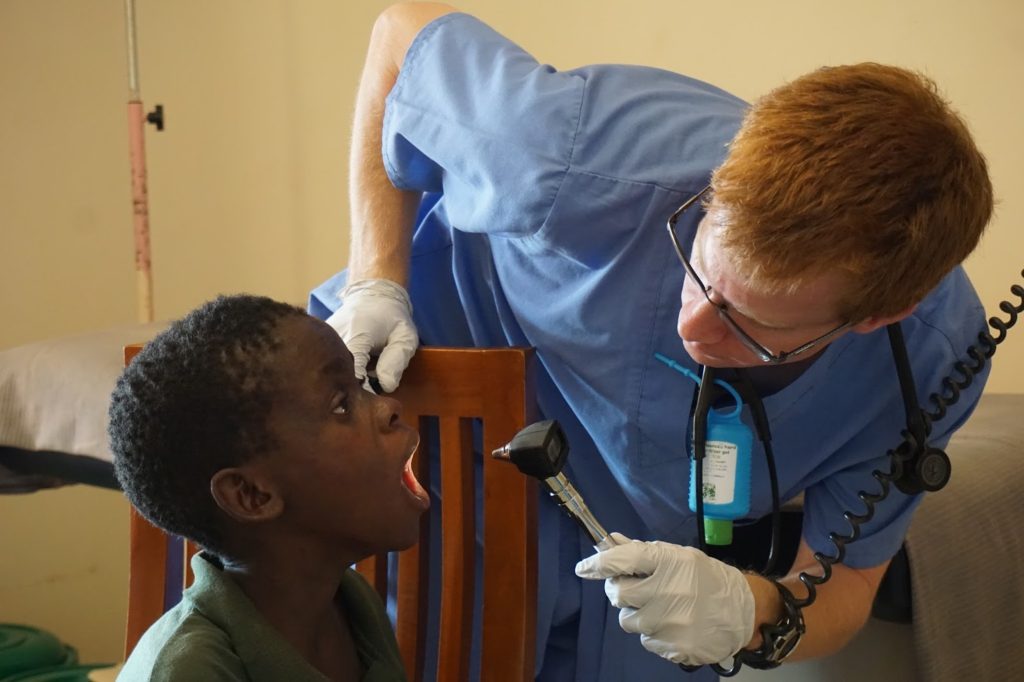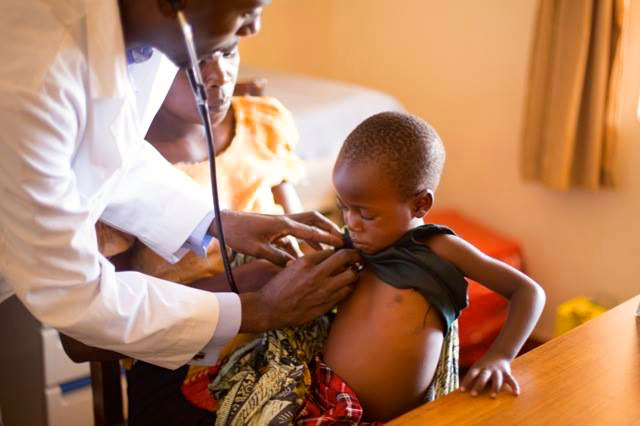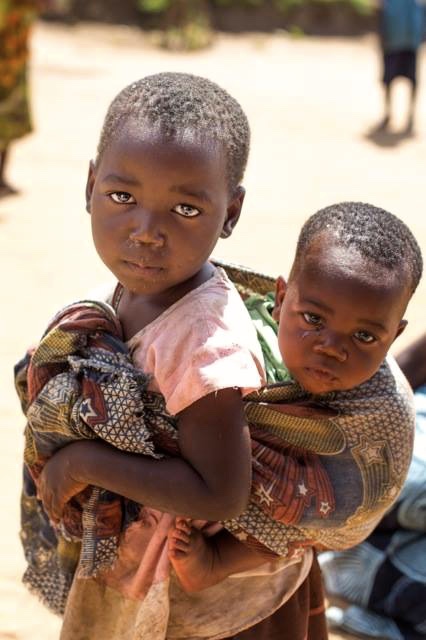We have mentioned “malaria season” a few times before in this blog. This is normally January through April in Malawi, but it mostly depends on when the rains finally start. This year it started raining for a few days in late December and within 2 weeks we saw the first huge influx of patients with malaria. Unfortunately, it has been raining just enough to get all the mozzies (mosquitos) moving, but not enough to really help the farmers with their crops.
We need to explain malaria a little bit more and give a short history lesson about malaria in the United States. First, mosquitos carry malaria; there is no way for a person to spread it to another person through personal contact or even body fluids. You can only get malaria if a mosquito that is carrying the parasite bites you. The parasite enters your blood stream, and it invades your red blood cells (which carries your oxygen). Then they hang out and multiply, a lot! They multiply until your red blood cells burst open and all the little malaria parasites invade other red blood cells. The process keeps happening until you take medication to kill the parasites and you get better or it continues until you become critically ill and die.
The complications of malaria are devastating, especially severe malaria. During this process the body is overwhelmed by an inflammation domino effect which leads to problems in the blood vessels all over the body. Once the blood vessels are weakened, it becomes harder for the body to remove the normal amount of toxic stuff it naturally makes. This leads to eventual blood flow problems that can weaken the heart, and cause swelling of the brain that will eventually end it death.
Malaria was essentially eradicated in the United States in the 1950s. “Between 1957 and 2014, in the United States, 63 outbreaks of locally transmitted mosquito-borne malaria have occurred; in such outbreaks, local mosquitoes become infected by biting persons carrying malaria parasites (acquired in endemic areas) and then transmit malaria to local residents.” (CDC Website: http://www.cdc.gov/malaria/about/facts.html)
Its hard for me to give a good example of a disease in the United States that is comparable to malaria in infection rate, rapidity of symptoms, and level of devastation it causes. The flu (influenza) might be the closest example possible, except people and not billions on tiny flying insects spread the flu.
Unfortunately, children under 5 years old are at the greatest risk of having severe complications of malaria and dying from it. In addition to malaria, a lot of the children in our area are malnourished as well. They lack the nutrients to keep a healthy immune system, so when the malaria starts bursting their red blood cells they become very weak, very quickly. The most challenging part is how fast these children can go down hill.
Once a mozzy (mosquito) with malaria bites you, the malaria parasites sit around in your blood for 7-14 days until it has multiplied enough to cause symptoms (headaches, body pains, vomiting, diarrhea, etc). So even though you might only have symptoms for 12 hours, the parasite has been doing damage for at least a week. Sometimes it takes parents 2-3 days to bring a child to a clinic, and they are often already weak and have severe anemia at that point. Even worse is when the parents take the child to another health center and they are out of the medications to treat malaria. It sometimes takes another day for the parents to come to CLI Hospital seeking care. At that point, it might have been 5 or 6 days and the child is severely dehydrated, has convulsed (seizures), having difficulty breathing and an anemia level that requires an emergent life saving blood transfusion. In the last month, we have seen at least 3 to 5 children like this every day at CLI Hospital. However there are days when we have had 8-10 critically ill children whom have needed urgent transfer.
We do all we can to stabilize these kids and start treating the malaria and other infections right away. Luckily, we have an ambulance that allows us to transport these extremely ill children to a nearby hospital (30-40 minutes away) that can admit them for in-patient care and blood transfusions if needed.
We expect 2016 to be one of the worst years for health care in Malawi in a long time. A couple weeks ago one of the national newspapers announced, “Government Kisses Aid Goodbye” (http://mwnation.com/govt-kisses-aid-goodbye/). The European Union and other major donors like Britain, Norway and Germany have decided to not directly supplement the Malawi National Budget for 2016-2017. There was a large financial scandal a few years ago and major contributors to Malawi’s budget requested some additional transparency, which has not occurred, thus they are pulling their funding (almost 40% of the national budget). The horrible thing is that the people most likely to suffer from all this are the poor, especially in the rural areas.
To add insult to injury, the drought and then flooding in 2015 resulted in major loss of crops that has led to the “Hunger Season” coming early this year. The “Hunger Season” in Malawi normally starts after crops have been planted but before they are harvested. During this time families run out of money for food and will starve, including many of the children. The body and immune system of a malnourished child is very weak, and it easier for them to get serious infections and develop major complications from malaria.
The CLI Hospital Outpatient Department is now seeing nearly 200+ patients a day and the Maternity Unit hit the 100 deliveries milestone a couple of weeks ago. This is a huge accomplishment, and we are so proud of our staff and their dedication to offering high quality health care to the community that surrounds CLI.
The number of women transferring to CLI Hospital for prenatal care is amazing (nearly 30 new pregnant mothers a week). Part of the draw is the fact that all women who come to CLI Hospital for prenatal care receive an ultrasound at the first visit. We are checking for any major problems with the baby, but mostly it is to help figure out how old the baby is and when they should deliver. Most women in Malawi do not know how long they have been pregnant when coming to prenatal care. Premature birth is a huge problem in Malawi and with the number of women with malaria continuing to rise, we are have lots of women show up in preterm labor. Luckily, ultrasounds done earlier in the pregnancy help us determine if the baby will be premature. We are encouraging our patients to come to prenatal care clinics as early as possible in their pregnancy, but unfortunately most still wait till they are in their 2ndtrimester. We are hoping that as we continue to provide more education to our community that women will begin to come earlier.
The infants born at CLI also get the extra care needed in order to decrease the neonatal mortality rate. Every infant is examined after delivery and then daily in the Maternity Unit, until the infant goes home. Every infant has a separate chart from their mother’s medical chart and the nurses evaluate the babies and check vitals on ALL the babies several times a day. Sadly, this is not the standard practice in Malawi. In most hospitals here, a clinician does not examine an infant unless there is a problem or the infant gets sick. Infants do not have there own medical chart and vital signs are not usually taken or recorded on the baby.
Another CLI Hospital standard is for a clinician or physician to examine each infant at their 1-week post-natal visit. We have a high return rate for both mom and baby post-natal visits at CLI. We believe this is because of the time our nurses spend teaching the moms before they go home after giving birth. They emphasize the importance of returning for the post-natal visit for the babies benefit as well as their own. Our whole staff is working very hard to provide the best possible care and an environment for moms and infants to be healthy and do well in the first weeks of life and beyond. We pray that we all continue to work together to be Christ’s hands and feet to our community.
Family Update:
For everyone who is now scared to death that Sophia might get malaria, don’t worry. She takes medication that protects here from malaria and she will probably take it for as long as we are in such a high-risk area. We are so blessed to have access to the medications we need to protect ourselves from such a horrible disease. Unfortunately it is crazy expensive and without health insurance, it would cost thousands of dollars a year to protect Sophia and ourselves. We wish our patients could have the same sense of security that we do about our precious baby.
Sophia is growing and growing and growing. She is finally eating some “solid” foods. We tried rice cereal and she immediately threw it up! She tolerates pear baby food in a jar and seems to like mushed banana as well as carrots now. She is making all sorts of noise, from babbling to screeching in the middle of church, she seems to have figured out how to exercise her vocal cords.
One thing that is really interesting is how everyone comments on how observant she is. If someone is talking in the room she will look directly at them and it almost looks like she is listening. Some friends at church say that she looks at you like she is absorbing everything you are saying and might actually say something back. Jared is convinced she is an extravert like him and just loves to be around people.
We have posted some pictures from our Christmas in Malawi. We were thankful that our friend Kate was able to spend the week of Christmas with us here. We had some good times and she and Sophia got along quite nicely. However, Christmas we definitely not the same this year without our families in the U.S. and we missed them a lot. Jared had his 31st birthday last week and we are thankful that we got to spend the weekend with our friends from the city and here at CLI, as well as have some great red velvet cake (thanks to Afshan) Below is an update on how we are currently doing with our support:
While we have raised additional one-time gifts over the past three months, we are still praying for additional monthly supporters to be able to continue to serve in Malawi. Please continue to pray for us and consider giving a one-time gift or committing to support us monthly. 100% of your gifts go directly to help support us as we serve our community surrounding CLI Hospital.
We are so thankful for all the generous gifts over the past year and a half which have made it possible to serve and share the love of Christ with some of the most underserved in this world. Please continue to share our ministry with your friends, family, and churches. Continue to pray for the community and people of Malawi, and finally, continue to pray for us and Sophia.
— Jared, Jenny, & Sophia


















Love the pictures! We are praying for the malaria epidemic as well as more financial support for your family. Thank you for serving!